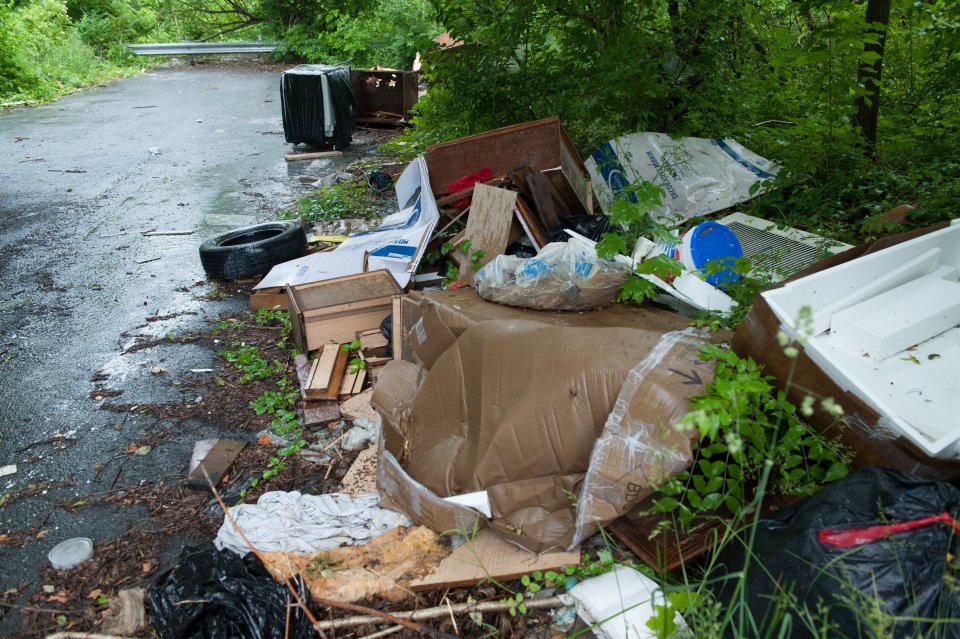EPA's 2024 No-Buy Challenge
Sticking to a new, classically “good” habit is a struggle for all of us, but one way to combat this is to make a resolution as a group. That is exactly what some EPA employees did for the month of January: we wanted to be more mindful about our relationships with consumerism and waste, so we embarked on a monthlong No-Buy Challenge. The Challenge was organized by the EPA’s Green Team, and we drew inspiration from one of our members from Region 3, who embarked on her own No-Buy year in 2023.
While a lot of “green” can be saved through a No-Buy Challenge, Green Team planned the Challenge specifically to reduce waste. Our society produces an enormous amount of waste to maintain our lifestyles, and that waste both harms our overall ecosystem and economies. Whereas once nature could recycle our waste, billions of tons of synthetic material waste now endanger our land and waters. Unfortunately, since there are many limitations to recycling, it is often best to “reduce” or even “refuse” instead. Waste reduction starts with buying reduction.
We wanted to be more mindful about our relationships with consumerism and waste.
To guide Challenge participants, Green Team created a framework to map out what a No Buy Challenge would look like. Early on, we tackled issues ranging from length of the Challenge to the time of the year when the Challenge would take place.
We settled on making the Challenge a month long, going with a “Goldilocks” approach, since a year seemed too daunting to attract many people, while a week or day seemed too short. Because part of the Challenge was to help participants to form long-term goals, we decided to host the No Buy Challenge in January—a month when people typically make New Year’s Resolutions. The final framework was a flexible, design-your-own Challenge that suggested elimination of non-essential categories like home decor, clothing, hobby items, takeout food and even secondhand purchases.
About the Challenge
The Challenge kicked off with a panel discussion. The panelists were practical social entrepreneurs: Holly Logan, a founder of the Philly Fixers Guild; Carolyn Lau, a PhD student and thought leader regarding “Buy Nothing” neighborhood groups; and EPA headquarters’ own Meg Hathaway, a hand-sewing and waste-reduction enthusiast who volunteers for the Washington D.C. Department of Energy and Environment (DOEE) Fix-it Clinic. The panelists discussed topics and fielded questions from audience members, ranging from repairing damaged items to prolong their use, to the constant consumerism messaging we receive, and even how there could be barriers to entry regarding no- or low- buy lifestyles.
On Jan. 2, 2024, the No-Buy Challenge kicked off in earnest. Along the way, Green Team hosted Office Hours where participants could chat with each other to share and learn ways to change consumption habits. Ideas flew as participants discussed homegrown solutions to reduce waste and cut down on frivolous spending in the process. Whether it was cooking more to replace takeout, mending torn clothes, or disabling apps that encourage spending, participants came up with a myriad of creative ways to reduce their buying.

Was it just a monthlong whim or caprice? Will it turn into a year (or more) long resolution? That’s up to each participant. Either way, thoughtful reconsideration of buying habits can be helpful. And even if the official event is done for this year, there’s no reason you can’t go on your own no-buy month, doing something good for the planet not just in the way you earn your money, but in how you spend it too.
About EPA's Green Team
The Emerging Leaders Network (ELN) Green Team is a non-labor employee group that helps to minimize the environmental footprint of EPA headquarters offices and operations. Our focus areas range from establishing and maintaining composting in the EPA kitchens to getting together to remove invasive plants at local parks on the weekend.

About the Author
Calvin Yahn
Life Scientist
Region 3
Calvin Yahn is a Life Scientist in the Environmental Protection Agency Region 3 in the Source Water Protection and Underground Injection Section working on Class V wells. He became involved with the ELN Green Team last year. Before EPA, he served in Zambia as an agroforestry Peace Corps Volunteer. Calvin holds an MPA from Indiana University and a BS in Environmental Science and Biology from Alma College. He enjoys living on a planet habitable for humans and an incredible diversity of life.
Editor’s Note: The views expressed here are intended to explain EPA policy. They do not change anyone’s rights or obligations. You may share this article. However, please do not change the title or the content, or remove EPA’s identity as the author. If you do make substantive changes, please do not attribute the edited title or content to EPA or the author.
EPA’s official web site is www.epa.gov. Some links on this page may redirect users from the EPA website to specific content on a non-EPA, third-party site. In doing so, EPA is directing you only to the specific content referenced at the time of publication, not to any other content that may appear on the same webpage or elsewhere on the third-party site, or be added at a later date.
EPA is providing this link for informational purposes only. EPA cannot attest to the accuracy of non-EPA information provided by any third-party sites or any other linked site. EPA does not endorse any non-government websites, companies, internet applications or any policies or information expressed therein.
